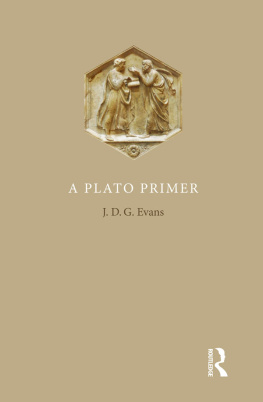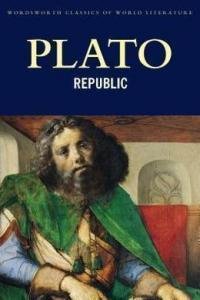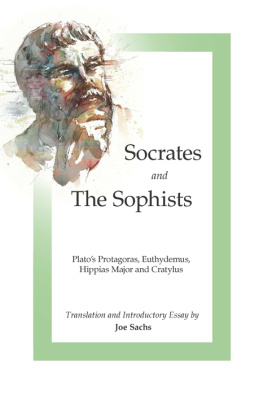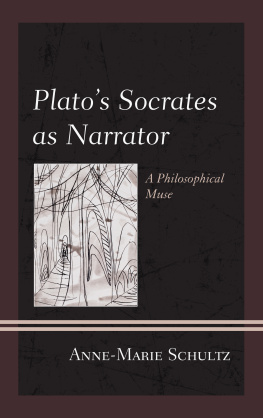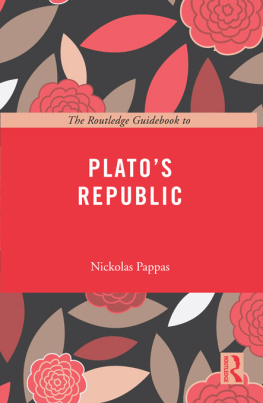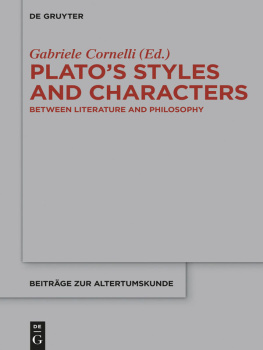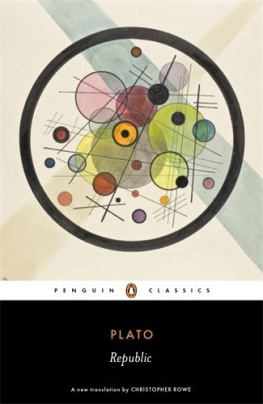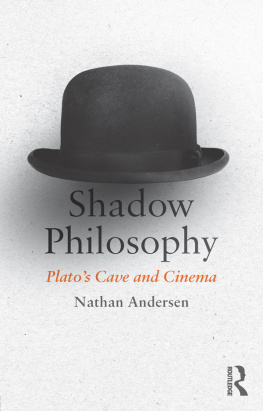A PLATO PRIMER
First published 2010 by Acumen
Published 2014 by Routledge
2 Park Square, Milton Park, Abingdon,
Oxon OX14 4RN
711 Third Avenue, New York, NY 10017, USA
Routledge is an imprint of the Taylor & Francis Group, an informa business
J. D. G. Evans, 2010
This book is copyright under the Berne Convention.
No reproduction without permission.
All rights reserved. No part of this book may be reprinted or reproduced or utilised in any form or by any electronic, mechanical, or other means, now known or hereafter invented, including photocopying and recording, or in any information storage or retrieval system, without permission in writing from the publishers.
Notices
Practitioners and researchers must always rely on their own experience and knowledge in evaluating and using any information, methods, compounds, or experiments described herein. In using such information or methods they should be mindful of their own safety and the safety of others, including parties for whom they have a professional responsibility.
To the fullest extent of the law, neither the Publisher nor the authors, contributors, or editors, assume any liability for any injury and/or damage to persons or property as a matter of products liability, negligence or otherwise, or from any use or operation of any methods, products, instructions, or ideas contained in the material herein.
ISBN: 978-1-84465-227-3 (hardcover)
ISBN: 978-1-84465-228-0 (paperback)
British Library Cataloguing-in-Publication Data
A catalogue record for this book is available
from the British Library.
Typeset in Garamond.
CONTENTS
My aim in this book is to introduce you to the main theses, concepts and arguments in Platos philosophy. Subtle, versatile and multifaceted though Platos thought undoubtedly is, it has a core that needs to be explored and savoured. My purpose is to present this core, as it appears over a large range of his works, spread out over many decades of composition and many philosophical topics. Through all this diversity Platos very original philosophical personality shines through.
I approach the material thematically, in terms of modern philosophical categories, in the seven main chapters. But within each of these individual treatments I follow the lines of argument in the main works of Plato that explore them. Every topic that I address can be and has been much more widely discussed in the scholarly and philosophical literature on Plato. I give indications about how to pursue these enquiries in Further Reading sections at the end of each chapter and the Bibliography. It is my hope that the initial steer to the understanding of Plato that is given in this book will point you in the right direction.
My many intellectual debts are far too numerous and complex to acknowledge here. Steven Gerrard, Publisher of Acumen, has been a good source of support; and Alan Weirs technical expertise has been invaluable. A deeper and more extensive debt is to generations of students, at the University of Cambridge, Duke University (North Carolina) and Queens University Belfast, on whom over nearly five decades I have pressed my ideas and who have responded in appropriately critical manner.
Above all I thank my wife, Rosemary, now and forever.
J. D. G. E.
Belfast
My husband David died in September 2009 while finishing the final manuscript of this book. I am deeply grateful for the support of Steven Gerrard and Kate Williams at Acumen in bringing the book to publication and for the helpful and encouraging comments of Acumens readers.
Rosemary Evans
Platos works have survived intact, through a manuscript transmission that is unusually free from corruption. The texts have been translated many times, and although I mention a good number of these translations in the Further Reading sections, most translations serve well enough to convey Platos meaning.
I do not presuppose any knowledge of ancient Greek and in general have rather little to say about issues of terminology. My view is that in terms of semantics, the meanings of individual words and expressions, the distance between ancient Greek and modern languages is narrower than many commentators assume. Such problems as there are lie rather in the area of syntax: how the individual words are linked grammatically to form statements.
Reference to particular passages is by the name of the Platonic work and a page-numbering system that follows the edition of H. Stephanus (1578). For more precise referencing the page number is followed by one of the letters ae, corresponding to the columns in the pages of this edition, and by the line numbers within each column. Th us a reference to about 90 lines of text might be Republic 4768, to a smaller section of about 20 lines 477de, and to a single sentence 477a67.
Plato was more than a philosopher; he was a master of literary composition who frequently wrote in colourful style. His works are not treatises; instead they range with nimble wit over many topics, only some of which are in any sense philosophical. But at the heart of his work there is material that is as definitely philosophical as anything in the most technical academic products in the twenty-four centuries that have followed his pioneering labours. So this book is about Plato and his philosophy. I shall extract arguments and ideas from a variety of his texts, written at various stages over his long literary career, and shall group them according to the philosophical topic areas on which they impinge. It is certainly worth reading Platos works as he wrote them, so that you can savour the appetizing surrounds in which he wraps his arguments. But it is the arguments that count.
Philosophy today is divided into many sub-specialisms: metaphysics, epistemology, logic, ethics, philosophy of mind, philosophy of language, to name just a few. We owe this contemporary academic division as also the larger divisions between different fields of intellectual study to Aristotle; and perhaps that process of division starts with Plato. He was given to classification and applied it to some cases of intellectual and sub-intellectual skills, although his own philosophizing does not deal in the modern distinctions within the activity. I shall start with his Republic. It is one of his longest works and expresses the centre of his philosophy, and it also precisely has the character of running together issues from the various parts of philosophy. Even today, as academic philosophers define themselves by listing specialisms in which they operate, they also recognize the essential unity of the different parts of the philosophical enterprise. Platos other works exhibit a similar plurality of themes. But in this book I follow the modern practice of treating the parts of philosophy as separable; in each chapter I extract one of the themes in the Republic and explore the complexity of its treatment in other Platonic works.
Above all I shall examine the role that arguments play in Platos philosophy. Here literary form and philosophical content cohere. Because his works consist mainly of dialogues in which there is rapid exchange between two participants, there arises a discipline in the direction of thought whereby one answer in the conversational exchange constrains the next. Dialogue fosters dialectic and, as we shall see in , to proceed dialectically is to take at least the first steps down the path of logical reasoning. Plato put a high value on dialectical method, as do modern philosophers on clear and cogent reason and argument. For similar reasons those who study Plato pay particular attention to the strict arguments in his work; and that is the approach here in this book.

